Media | Articles
Mother Ducker: Meet the Woman Behind the Jeep World’s Happiest Obsession
How does a simple act of kindness suddenly explode on an international scale? How do you face the pain and discomfort caused by a global pandemic and meet it with positivity? How does a lifetime of loving an antiquated but charming off-road engineering philosophy catapult you from an ordinary enthusiast to the originator of a Jeep phenomenon?
Allison Parliament considered none of these questions on that fateful summer day in July 2020, when she set a rubber duck on the hood of a Jeep Wrangler in an Ontario parking lot. The only reason she did it was because she wanted to write a nice note for the owner, and she didn’t have a piece of paper. So she wrote the message on a rubber duck she had handy (more on that later), thinking little of it.

Four years on, hundreds of thousands of Jeep fans are trading ducks like playing cards all over the world. The act of placing a duck on a Jeep has become a verb: “ducking.” On Instagram, searching #duckduckjeep will return more than a quarter of a million results, with other variations of the hashtag pulling about the same. A tiny act of kindness morphed into a movement in what felt like months, and Parliament, the center of the craze, has had her life radically transformed as a result.
It is impossible to look back at 2020, and Parliament’s story, without acknowledging the pandemic. At its peak, Covid-19 affected practically every normal aspect of human society. Both the virus and the measures to address it sowed divisions and discord. For Parliament, though, her main focus was caring for her grandmother. Parliament resolved to make the day-long trek north from her Alabama home to southeast Ontario to be with her aging relative. “She was up there alone, in her late-80s,” Parliament says. “For seniors, being alone can be [the cause of] early onset dementia. It can do a whole bunch of things to their mind when they’re not active. I didn’t want that for my grandma because she helped raise us while my mom was going through breast cancer. Grandma and Grandpa gave us everything, so I wanted to do the same for her.”
Parliament had recently taken delivery of her dream car, a 2018 Jeep Wrangler Unlimited, which was the realization of a lifelong fascination with the stick-axled, seven-slatted go-anywhere machines that permeated her upbringing.

Marketplace
Buy and sell classics with confidence
Her uncle, Gregory Anderson, a small-town lawyer from Ontario, was a serial hobbyist with a penchant for restoring old vehicles. During early summers, Parliament would join her great aunt and uncle on their farm for a few weeks. She quickly learned where Anderson was most comfortable—in the garage—and adapted to that context in order to foster a better relationship with him. “He was a very sweet man, but he was easier to talk to when you were working on a vehicle with him,” Parliament recalls.
Anderson, who died in 2012, revived many classics, from Mustangs to Model Ts to military vehicles, but the Jeeps caught young Parliament’s fascination the most. “He used to take us out anytime we’d ask in the summer in the Jeeps, since they didn’t have the tops, and we’d roam around the thousand acres they owned. He took us everywhere, he loved every moment he got with us, and he was a big part of my life in a lot of ways,” she says. “Losing him was really hard.”

More than just an incubator for Jeep fandom, however, Parliament’s time in the garage with her great uncle became a metaphor for how she came to view the automotive hobby as a whole. “He opened a door, especially I think for me as a child, to know that girls could be into cool cars, too.” To this day, her efforts around inclusivity within the Jeep community echo that sentiment and aim to pass such an important truth to the next generation.
Those foundations eventually led Parliament to chase a Wrangler as her dream vehicle. But just as important was her understanding that loving those who cared for you often means going the extra mile—or in this case, thousands of miles. Ready to face the dystopian context of the time, she pointed her Wrangler toward the Canadian border and her final destination: Grandma’s house, in Orillia, Ontario.
On her way north, some 13 hours into the trip, she stopped to get gas in Woodstock, Ontario. As she got out to fill up, she heard someone yelling. Fatigued from the drive, she didn’t think much of it. “All of a sudden I had this man in my face screaming at me, pushing me into my Jeep, yelling at me to go back to my own country.”

Though born in Canada, Parliament lived in Alabama at the time, and her Jeep was plated as such. Maybe it was paranoia that provoked the altercation. Maybe, wound drum-tight by Canada’s particularly strict lockdown restrictions, the man had simply snapped.
No matter what, it was a hostile, particularly un-Canadian interaction in a country known for its friendliness. “I am Canadian-born, Canadian-raised,” Parliament says. “Much of my extended family still lives here, including the grandmother that I was on my way to care for.”
Without even filling up, she got back in her Jeep and drove away. The whole thing scared her. Her partner talked with her over the phone, doing his best to calm her down over the next half hour it took to find another gas pump.

She finally arrived at her destination and began the government’s mandatory two-week quarantine for foreign visitors. At the end of that period, she headed out to a small shop near Bancroft with a relative. Even just going shopping, at that point, felt like a novelty.
Parliament came across a gaggle of rubber ducks in the shop. Planning to prank her partner by hiding them throughout the house they were staying in, she bought them. “I needed to laugh again, to feel safe,” she says.
As she left the store, she saw a kitted-out Wrangler parked near her own. She liked it and wanted to leave a small token of appreciation and approval. “Jeepers are kind of crazy, and a compliment on your Jeep is always a good feeling,” she says.
She didn’t have any paper with her, but there was a marker in her glovebox. She scribbled a small, simple message onto the only shareable token she had—a rubber duck.
“Nice Jeep, have a great day.“
Almost immediately, a large man stormed out of a nearby restaurant and headed her way. The gas station fiasco flashed in her mind. “What are you doing?” was the man’s firm and accusatory opening salvo.
He picked up the duck and read its message. The bristly demeanor cracked, and a smile flooded his face. “He thought it was a great thing, said it made his day,” Parliament says. After chatting with her about Jeeps for a few minutes, the man suggested they take a picture of it and put it on social media. Unsure of what to say in a caption or how to tag the post, Parliament suggested #DuckDuckJeep. Maybe it would go around town and make a few people smile and then it would die off, she figured.

Instead, it blew up. Weeks later, a Massachusetts newspaper called, seeking an interview with the woman who had started the Duck Duck Jeep craze. Then another call from another outlet. Then another.
The duck was out of the proverbial bathtub. Parliament started a Facebook group that today has about 76,000 members. Other unofficial pages sprung up, many also boasting high five-figure memberships.
It wasn’t long before Parliament, a self-described introvert, got recognized in public. “Around Christmas time that year, I was doing some shopping when a lady recognized me,” she recalls. “I remember just putting everything down and very quietly disappearing. I went and hid in my Jeep, waiting for it to all blow over.”
It didn’t. At all. Soon, Parliament had companies reaching out with offers to outfit her Jeep. Then the events came calling. When the Wabash Jeepers out of Terra Haute, Indiana, asked her if she’d be willing to attend their annual pink ride, a fundraiser event for breast cancer, Parliament made her “first and easiest yes.”
Parliament’s aunt succumbed to the awful disease at 32, and her own mother was diagnosed at 33, while pregnant with Parliament’s youngest sibling. “She had [my brother] on Monday, then she went in for surgery on Friday of the same week.”
As more and more clubs came calling, despite her introversion, Parliament decided that she had a responsibility to harness her—and the phenomenon’s—popularity and use it as a force for good. She quit her lucrative job as a financial professional and founded a nonprofit organization around the act of Jeep ducking; “Ducking for Teachers” helps support local teachers by providing funds to purchase desperately needed school supplies.
***
Last summer, I met up with Parliament and Jason Klatt, her close friend and the resident mechanic of Official Ducking Jeep, at Toledo Jeep Fest, an enthusiast gathering in northwest Ohio. Toledo also happens to be the home of the Stellantis plant that produces the Wrangler and the Gladiator. For a single weekend in August, the area overflows with more than a thousand Jeeps, coming from as far away as Brazil and Colombia. Nearly all of them are customized in some fashion, ranging from mild to triple-take wild.

It was early Saturday morning, but the parking lot of the Owens Corning building was already bursting with Jeeps awaiting their orders to file in for an all-Jeep parade through downtown Toledo. Parliament and her crew were parked some distance back from the front of the line. A massive plush yellow duck was strapped to the top of her Wrangler, and dozens more littered the dashboard, the floorboards, and pretty much everywhere else.

Thousands of Jeep enthusiasts of all ages milled about. Speakers blared everything from Twisted Sister to Tupac. Some Wranglers wore massive tires on small wheels—placing function over form—while others wore massive wheels with skinny, street-focused tires. Engines—some stock, some fettled to the tune of tens of thousands of dollars—revved up and down the line. Horns blared for no reason at all. It was as if an electronic rave had collided with a country music festival, which then rolled into a rock show that then barreled through the brick wall of a hip-hop concert, Kool-Aid Man–style. There was dancing, laughing, high-fiving, and, of course, plenty of ducking.


Amid this audiovisual hurricane, a few Jeepers approached Parliament. She talked with them for a bit, then signed a half-dozen ducks for them. When the first group left, Parliament slid back toward the circle of her colleagues. Then another group arrived, and like clockwork, she walked out, greeted each one, and listened patiently as they shared kind words about her efforts or why they loved passing out ducks. All smiles, she signed again, then waved as they set off across the parking lot. She was never standoffish, but you got the sense that even though she’d likely had the same interaction thousands of times before, there was still some discomfort for her in the exchanges.
The parade began. Have you ever seen someone realize in real time that they’re about to have a “main character moment,” where a captive audience will be shouting and waving in their direction, even if only briefly? This was that moment for every Jeep—and every occupant of every Jeep.




The volleys of candy started immediately, with Jeepers—some in full costumes, some with flip-flops and cut-off T-shirts, some with garb that matched their rig’s custom paint job—lobbing sweet treats to those who lined the streets. Roll bars became seats in the slow-moving processional, tunes were cranked to irresponsible levels, and doors were often nowhere to be found—in true Jeep fashion.
As they trundled through the streets of downtown Toledo, Parliament, Klatt, and other members of her team lobbed rubber ducks into the crowd. A handful of folks recognized her tricked-out rig, but for the most part, the focus was on the free ducks, not the throwers.

Toledo Jeep Fest organizers reckon that more than 60,000 ducks were handed out over the course of three days, but that number feels conservative based on my time there. Parliament and her crew handed out several hundred on their own, plus thousands of duck stickers.
I expected Parliament to be hounded by Jeepers pretty much the entire time we were together. Like an all-star baseball player on home turf during batting practice or a headline musician leaving the venue after a killer set. While there was an autograph booth for a brief stint, which included folks waiting in line, Parliament was never utterly swamped with fans.

Later that day, I followed Parliament around a park’n’shine event that swallowed nearby streets. She and Klatt were provided with a golf cart in which to cruise the show, along with an event staff member who had been shepherding Parliament through local TV and radio hits throughout the week.
Multiple times, Allison’s sherpa stopped groups of visitors to ask if they wanted a picture with the founder of the Jeep ducking phenomenon. Many folks gleefully agreed, taking time to share their ducking experiences with Parliament. But others had no idea what was being asked of them. Some, even while clutching plastic ducks, stood there in awkward silence not knowing what to say, totally unaware that the ducking thing even had a founder.
There was a strange irony to the whole situation. The custom grew from a single duck to a worldwide phenomenon, all in just a few years. One look across the parade staging area that morning was all I needed to understand how the zeitgeist of modern Jeep fandom had taken this thing and then driven up Mt. Everest with it. These are deeply passionate people; gifted with a new method to express that enthusiasm to each other, was it ever going to end up any other way?




Sometimes a small good thing grows into something greater than you could ever imagine, but the price of that swell can prove a bit unsettling. Understanding and accepting which parts of this new, often unrecognizable beast you’re then responsible for can be complicated; especially when you’re not naturally wired to be the sort of outgoing, bubbly personality that something like ducking embodies.
And there in the eye of the storm was Parliament, a quiet, reserved personality who is open about the fact that she doesn’t like being the center of attention. In fact, there was a visible tension between the overwhelming outward-facing responsibility she felt to represent this now-universal act in a positive manner and her very personal desire to just be another Jeeper enjoying that act. And in among it all, she had to accept that the movement may have overtaken her.

Parliament’s involvement in the world of ducking has only grown more formalized through the years, so resolving that tension may have to wait. Jeep has officially recognized her as the founder of Duck Duck Jeep, with the brand’s former CEO, Christian Meunier, going so far as to endorse her on record at the New York auto show. And while a few folks I talked to at the event seem to recall ducks and Jeeps mingling before the pandemic, nobody had any concrete proof of an official, organized effort existing prior to the one Allison started.
Of course, every movement has its detractors. There’s a small but vocal group vehemently opposed to the act, for several reasons ranging from somewhat reasonable to downright ridiculous. On the reasonable side, some folks feel that plastic ducks are an environmental hazard and that there are other, more eco-friendly ways to show appreciation for someone’s ride. At the other end of the spectrum, some see the whole thing as dumb and pointless, an embodiment of just how “soft” people are now. Parliament has had sour experiences with anti-duckers at events, and there have even been a few news stories that have knocked ducking, calling it “bizarre” or even “pathetic.”

With any act of kindness, the line between a tiny impact and a massive one is often far thinner than anyone can realize in the moment. At the same time, if people aren’t receptive, Parliament doesn’t want to force the issue. On occasion, she runs into someone who has no interest in their Jeep getting ducked. “There are some people out there who don’t want them and don’t like them,” she said. “If that happens, you say, ‘Thank you, have a great day. It was nice to meet you.’”
Though the whole exercise has grown into something no one person or group can control, Parliament wants Jeep ducking to be a source of joy first and foremost. “We want to welcome people into the [Jeep] community. We want people to have a place where they feel safe. A place where you can come and make friends and have friends wherever you are, no matter what’s going on. Sometimes, that’s all people need. The ducks make people feel heard, make people feel seen.”

Parliament acknowledges she has good days and bad ones. “But I know what it’s like to struggle. I have major depressive disorder, which is not something we hide. I take meds every day, but I’ve also always had a huge support system in my family and a few of my other friends that are always there.”
She hopes, in part, to be able to offer that kind of strength to those in the Jeep community who might lack a similar support system. Parliament has taken countless phone calls from Jeepers struggling with mental health issues, and she lends an ear when someone in need reaches out for help.
Parliament feels that the broader Jeep community’s baked-in good vibes and support for fellow Jeepers make the whole duck thing possible. During my time getting to know her she rattled off several stories from her own Jeeping experience about parts, beds, food, and more acts of generosity offered up with no strings attached by fellow Jeepers. Surveying the streets of Toledo that weekend, it was easy to draw the connection. Ducking stays afloat, even post-pandemic, because it fulfills an instinct to connect and share one’s passions with others. People are at their best when they feel lifted up.
At day’s end, festivities dwindled and we said our goodbyes. I walked the few blocks back to where I’d parked the Wrangler Rubicon 4xe, a loaner from Jeep to get me to and from Toledo. Its High Velocity Yellow paint stuck out like a pile of new tennis balls on fresh asphalt, easily visible from 300 feet. As I neared the driver’s-side door, something cheerful and pink caught my eye.
On the handle was a rubber duck. In the reflection of the window, I caught myself grinning.
***
Check out the Hagerty Media homepage so you don’t miss a single story, or better yet, bookmark it. To get our best stories delivered right to your inbox, subscribe to our newsletters.

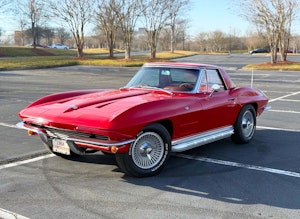
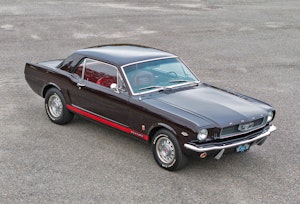
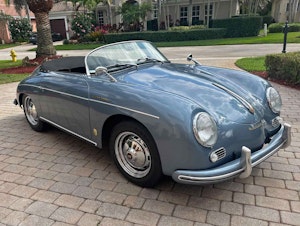
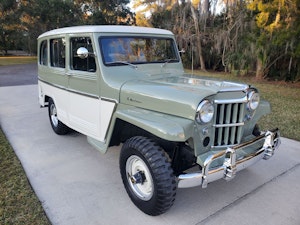
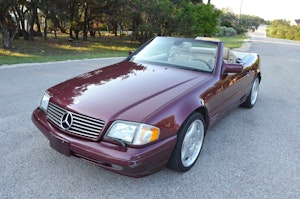
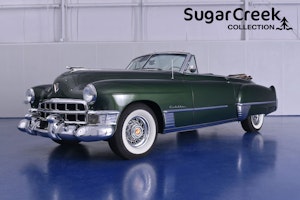
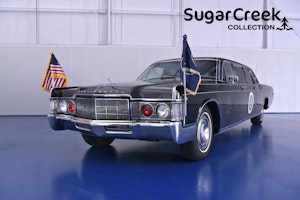
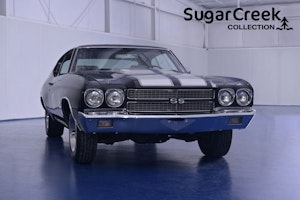













































































“He used to take us out anytime we’d ask in the summer in the Jeeps, since they didn’t have the tops, and we’d roam around the thousand acres they owned. He took us everywhere, he loved every moment he got with us, and he was a big part of my life in a lot of ways.”
Allison, your Uncle Gregory is now one of my heroes!
Since I quit hunting and off-roading, like my old Dodge pick-up truck, my Jeep hardly ever leaves the ranch property. Doubt it’d ever get a rubber duck on it if it went to town. But it’s taught a few grandkids how to drive out in the field. I do not think I’ve been without a Jeep in my stable since the early ’80s – I love ’em!
I thought I hated the Corvette wave. Now I am glad we are not exchanging toys.
jealousy is unbecoming.
Jeep vs Corvette? Not even close. 😝
A corvette is an old man’s Viagra
Bingo.
Far better performance cars have been built, not bought.
But to dunk on a sub-culture and reference back to a more expensive vehicle smacks of classism and haughty arrogance.
I’m not into the Low Rider scene, but I can appreciate the artistic nature, craftsmanship, and vision without ridicule or scorn.
If you’ve ever wondered why more young people aren’t at your events, maybe it is you and your attitude.
Glass houses, folks.
I guess it’s a Jeep thing and I don’t understand. Nor do I want to.
Understanding others is the only way forward.
I wondered about the rubber ducks i saw on Jeeps.
Never had the opportunity to ask an owner…..
…..Now I know……
The first question most people likely have after learning about the duck thing is “Why ducks?” It’s great to have some context finally. When the Bronco was reintroduced, many wondered what the Bronco’s exchange item should be. Ducks would be a copycat. Some have found unicorns or rubber horses. I found copper mini horseshoes with a bit of an aged patina that I think are a great item that someone might keep rather than throw away.
Now I have a reason for seeing so many wranglers with a load of ducks and other things on the dash of their vehicles. Some I am surprised they can even see out the window they have so many things blocking their vision.
Great article! Don’t get the ‘us and them’ in the comments.
Don’t understand some of the negativity around this. There is way too much of it in the world today and any attempt to bring some positivity is a good thing IMO.
If it’s not your thing, toss it and move on. Much like we tell people to move on a social media post, editorial or comment.
The author is right about how fast it caught on. Found the first duck sitting on the windshield wiper of our JL around mid 2021. Didn’t realize it was that much of a thing. Since then we’ve traded a few and dropped a few on other Jeeps and almost every Jeep I see has ducks lined up on the dash. I’m ambivalent about it. My wife gets a smile over it. No big deal
Yeah, this strikes me as some people just having a bit of fun with something. It may strike some as “silly”, and, as is always the case, some just don’t get how to have fun, or need to denigrate others for the way they choose to have it. But I look at it like this – if they’re not hurting you, why should you care? Let ’em have their fun in whatever way they want. But of course, there is always someone out there who will look down their nose and pooh-pooh things just because it isn’t their “bag”. Geo is right: just move on!
There needs to be a correction here.
Ducking started in the MINI scene by a Miniac named Ed Smith (Maxamini) who sadly passed away in 2005. He was known for giving away small rubber ducks at Mini events.
After his passing this became an international tradition and tribute among MINI enthusiasts that was later adopted by JEEP owners, but it certainly wasn’t started by them.
OMG – controversy! Congressional hearings need to be instituted right now!
Enjoyed the story!
Great article and summary. I am not overly fond of the Ducking thing, BUT – that said, this insight into it was interesting… I always go to the Toledo Jeep Fest, fun stuff. I was a Jeep engineer for 32 years – on Wrangler. While I have had many performance cars, all my daughters drove Jeeps – They loved them. My favorite line from your article? – ” Horns blared for no reason at all. It was as if an electronic rave had collided with a country music festival, which then rolled into a rock show that then barreled through the brick wall of a hip-hop concert, Kool-Aid Man–style” LOL
I recently came out of a long day in health care. I found a small yellow duck on the door handle of my Gladiator.
Brought a smile to my face. Had no idea what “ducking” was till I shared the story with a friend of mine and she looked it up. Sent this article to me and here we are.
For those who have harsh and unnecessary comments along the way, well you just need to get “ducked”. It will surely make you smile.
Great article! Hoping to get back to the Toledo Jeep Fest this year!
As a Canadian the actions of some of my countrymen still embarrass me. The actions this lady experienced were typical of the behavior of too many. It wasn’t just acted out against folks with foreign plates. In British Columbia I saw the same rage aimed at people with plates from other provinces. As someone who worked as a fleet manager, I am completely aware that a license plate does not guarantee the residence of the operator. I could not believe the unthinking actions behind these attacks on people. I tend to be cynical by nature. These acts did little to improve my outlook.
Like other countries, the governments of Canada propagated and fueled paranoia and fear through rules and regulations in many of it’s citizens. Everyday brought images of those who took there direction from the TV screen and ignorance alone and went out to commit terrible and ungracious acts against others. Few did this from fear. Most did it in some misdirected need to impose control over others in a world that has become increasingly out of control. I don’t look here to open a debate about the validity of pandemic reactions or the illnesses that were created out of the responses.
I took solace later in the fact that the movements to stand-up to the world’s out of control governments started in my country. Started by truck drivers, teachers, restaurant workers, delivery drivers, doctors, grandmothers… you get the idea. Regular people. I hope some perspective after the fact as this dark stain on humankind moves to history can be found by those who yelled in the faces (one of the millions of ironies from this episode) of people they took it upon themselves to judge others. I offer an apology to Allison for her reception in Canada and for the fact that this story still has to explain why she was here. The border that I grew up near was an open and friendly one. No one with an American license plate owes me an explanation as to why they drive down my street ever.
I guess my feelings on the ducks is that it does seem to be a little silly but if I owned a Jeep, it wouldn’t offend me to find a plastic duck on the hood. It would amuse me and remind me that people can be nice when they want to.
I haven’t logged into this forum in months, if not more than a year. But I decided to; only to thank you for your well-written commentary. As a Detroiter who used to enjoy visits to Canada, it’s a shame how people were manipulated, Twilight-Zone style. Now I travel only when necessary for business. It was heartening to see the pushback from your truckers. And frightening to see the government’s response. Have a great day fellow traveler.